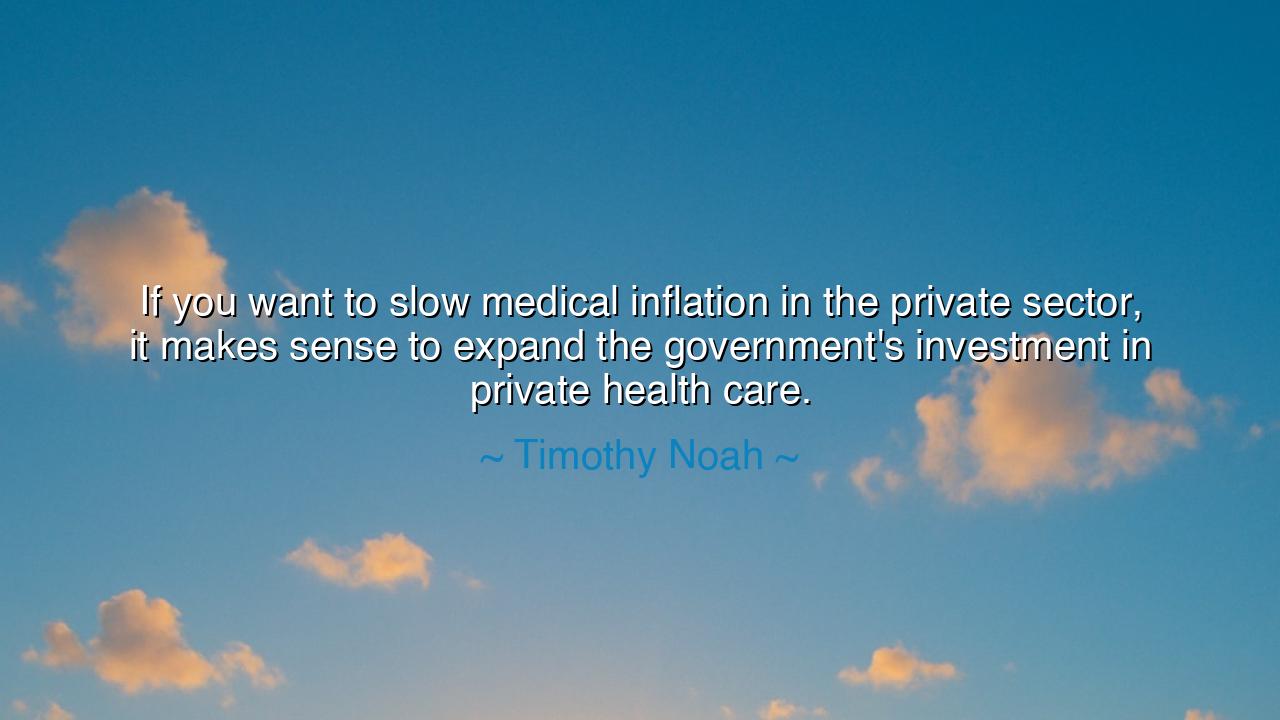
If you want to slow medical inflation in the private sector, it
If you want to slow medical inflation in the private sector, it makes sense to expand the government's investment in private health care.






When Timothy Noah declared, “If you want to slow medical inflation in the private sector, it makes sense to expand the government's investment in private health care,” he was not merely speaking as a policy thinker — he was echoing an eternal truth about balance, stewardship, and the interdependence between the public and the private, between the individual and the collective. His words rise from the same wellspring of wisdom that guided the ancients: the understanding that no society thrives when its health — the very breath of its people — is left to the chaos of unbridled markets. For health is not a commodity to be traded, but a sacred trust, the foundation upon which all human endeavor rests.
In the modern world, where the cost of healing has grown heavier than the burden of illness itself, Noah’s insight burns like a torch in the fog of greed and confusion. He reminds us that when the hand of the state joins, rather than opposes, the hand of the healer, both may work in harmony to serve the greater good. The ancients would have called this symmetria — the harmony between forces that seem opposed but are, in truth, necessary halves of the same whole. Government and private care, when balanced, become like the twin oars of a boat: one alone can move the vessel, but both together can steer it true and steady through stormy seas.
Consider the example of Harry Truman, who, after the ashes of World War II, sought to forge a new covenant between government and medicine. He saw that private health care, though vibrant, was unequal — that millions suffered while a few prospered. He proposed public investment not to destroy private medicine, but to strengthen it, to temper its excesses and extend its reach. Though his vision met resistance, its echoes lived on in Medicare and Medicaid, which brought health and dignity to generations who might otherwise have been forgotten. Truman’s legacy is the living proof of Noah’s insight: that public investment can make the private realm more just, more humane, and more enduring.
The ancients knew this pattern well. In the city of Athens, during the age of Pericles, the state funded public works — not merely to glorify itself, but to strengthen its citizens. Temples, theaters, and even healing sanctuaries such as the Asclepieia were maintained by public wealth for the benefit of all. Yet the artisans and physicians who tended these sacred places were often private masters of their craft, not servants of the state. In this balance — public patronage and private skill — Athens found its golden age. When either side forgot the other, the city fell into decay. So it is today: when governments invest wisely in private healing, the whole nation flourishes; when they withdraw and let profit rule unrestrained, sickness spreads not only through bodies, but through the soul of society.
Noah’s statement, therefore, is not a mere argument of economics — it is a moral teaching. He reminds us that health care is not a battlefield between ideologies, but a shared responsibility between all who live within one nation’s heart. Inflation, that creeping shadow of greed and inefficiency, cannot be defeated by neglect or division. It must be met with unity, with shared purpose, with the conviction that human welfare is the true measure of prosperity. When the government invests, it does not weaken freedom; it preserves it — for no man is free when he is too sick to live.
The deeper wisdom here is this: cooperation is the cure for decay. The same truth applies beyond medicine — to education, to labor, to the nurturing of communities. Every system left to pure self-interest will eventually devour itself, like a serpent eating its own tail. The wise among the ancients understood this cycle well, and they built systems of checks and balances, of public stewardship and private innovation. Timothy Noah speaks with that same ancient spirit, calling us to remember that only through shared care can humanity prosper without consuming itself.
And so, my friends, take this lesson to heart: build bridges, not walls, between the forces that shape your world. Whether in government, business, or your own home, let generosity temper ambition, and let compassion guide every policy, every trade, every choice. When you see injustice born from neglect, speak; when you see suffering born from greed, act. For the health of a people is the health of the world itself. And if we fail to protect it together, no wealth or progress will save us. Thus, as Timothy Noah teaches, invest not only in systems, but in souls — for only through shared responsibility shall the body of humanity remain strong, whole, and free.






AAdministratorAdministrator
Welcome, honored guests. Please leave a comment, we will respond soon